Mexico, the United States, and Canada will jointly host the 2026 World Cup. As the event approaches, cities are getting prepared for the upcoming games. However, it is rather surprising to see how different cities are reacting to the World Cup approaching. Some cities are outraged at the rising costs, some cities are falling in love with their ever-rising economic impact projections, and some are just happy to have the games coming to their city. Unfortunately, some cities now realize that the expense of staging these games can massively outweigh the so-called benefits. Most leaders in host cities do not fully read through FIFA’s city contract. Instead, they offer “tax breaks and millions of dollars in both public and private investments for a chance at hosting the 2026 Fifa World Cup games.”
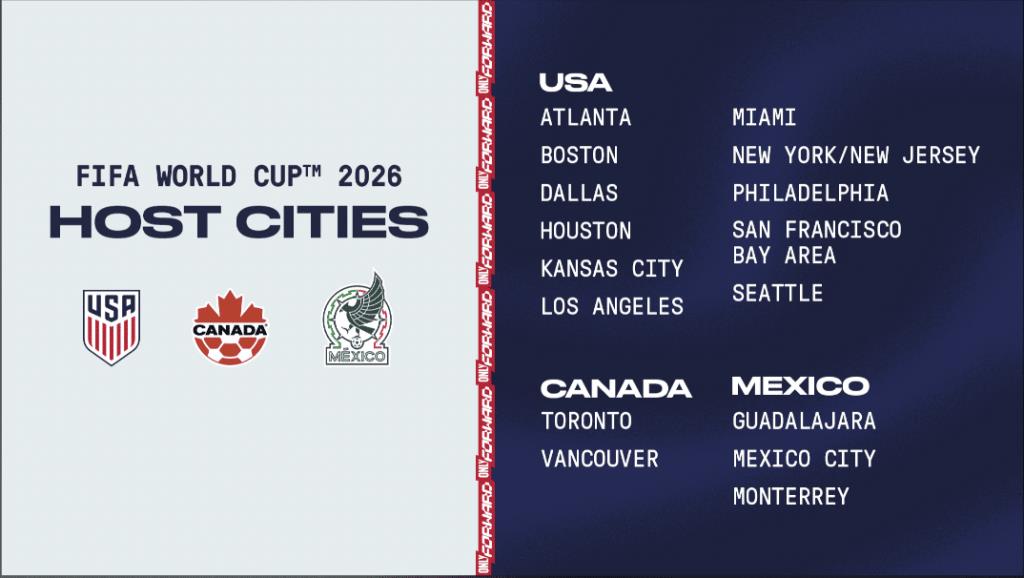
– USSoccer.com
But now that some cities are talking about the rising expenses of the World Cup, we are seeing an increase in articles from host city newspapers discussing how much of an economic impact their areas will have from the World Cup. That reminds me of the 1994 World Cup that the United States also hosted. The economic impact projections during that time were $4 billion. After it ended, each hosting city lost “an average of $712 million in income relative to predictions“. Let me do some math here. That means the overall loss for the World Cup was $9.26 billion. Also, that means a $13 billion difference between what was projected and what happened.
In 2010, FIFA helped South Africa by giving them $483 million to cover the costs of the World Cup, which were projected to be $431 million. The final cost? $5.2 billion. FIFA refused to lend them a single additional dollar. In 2014, Brazil residents were told they would see this economic glory when they hosted the World Cup. Instead, the World Cup ended up costing the country $15 billion, driving it into a massive debt crisis. In 2006, Germany hosting the World Cup was forecasted to create 60,000 new jobs. It created zero new jobs. Michael Leeds’s book The Economics of Sports recaps the results of events such as the World Cup. The findings are rather clear…the pre-event economic impact and revenue numbers are “consistently overly optimistic.”
Just a bit outside.

– Tenor.com
This time, however, things are GOING TO BE DIFFERENT! What can the cities hosting the 2026 games financially expect? How about $5 billion in economic impact? A 2018 study found that, depending on the city, the economic impact could range from $90 million to $480 million. There aren’t any more details on the study done but…$5 billion!!! It must be true! Even better, that 2018 study has been updated. Guess what? Every host city will now see between “$160 to $620 million in economic impact“.
1) Boston
Boston people do seem quite excited at the prospect of hosting a World Cup game. In fact, they get to host six games for the 2026 World Cup. But the real prize is the $500+ million in economic impact from the games. Where does this number come from? “FIFA studies,” per CBS News.
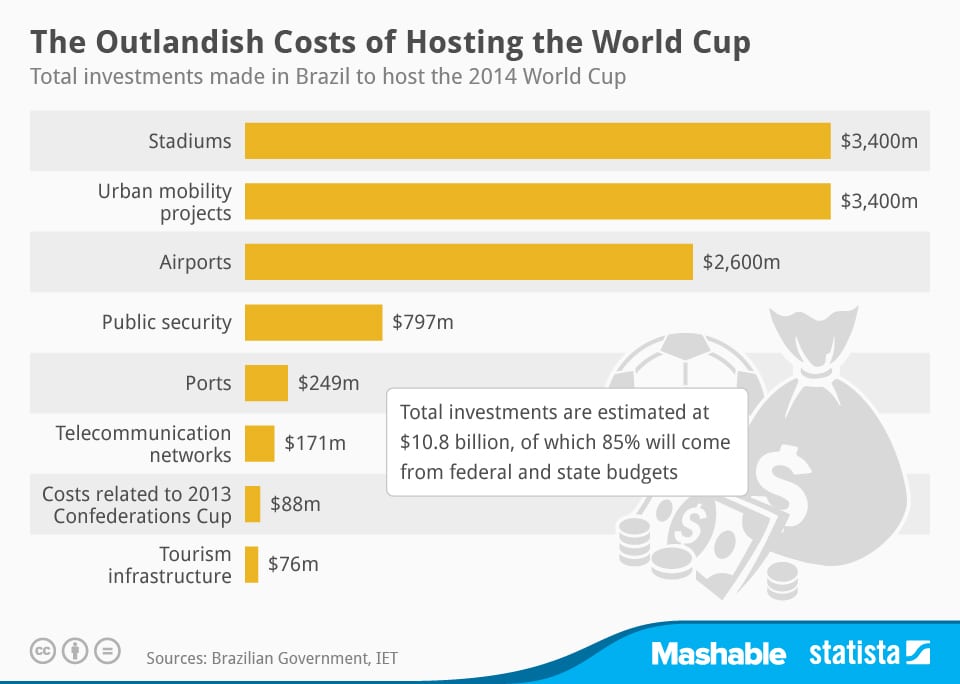
– Statista
2) Houston
They are counting down the days in Houston until “the biggest sporting event in the world” comes to Houston. What are they expecting? Money will be coming to them at a previously unthought record. City officials are telling local reporters that the economic impact will be “one for the history books.” According to city officials, the economic impact number is “set to be north of $1 billion”:
“This is going to be an economic boom for Houston and our region unlike anything we have ever seen…This event will be like hosting seven Super Bowls in 20 days” — Bishop James Dixon II, Harris County Sports & Convention Corporation, KHOU, 02/16/24
Some in Houston are so excited that they seem to be going slightly crazy:
‘Hosting a World Cup is like seeing a comet,’ said director of the youth soccer club for the Houston Dynamo and Dash Randy Evans — Click2Houston, 06/23/22
That must be one rich-looking comet.
3) Dallas
Nine games will be played in Dallas. The Dallas Sports Commission asserts that the World Cup will bring the region $400 million and create 3,000 jobs. But Scott Wysong, a professor at the University of Dallas’ College of Business, believes that if you add the economic impact with any indirect impact, the number rises to $1 billion. According to the Dallas Morning News, the World Cup brings a “treasure trove of tourists ready to spend their money.” Texas businesses better prepare as an “opportunity of a lifetime” comes to your area to “usher in a new age for what is already the greatest sports business market in the United States.”
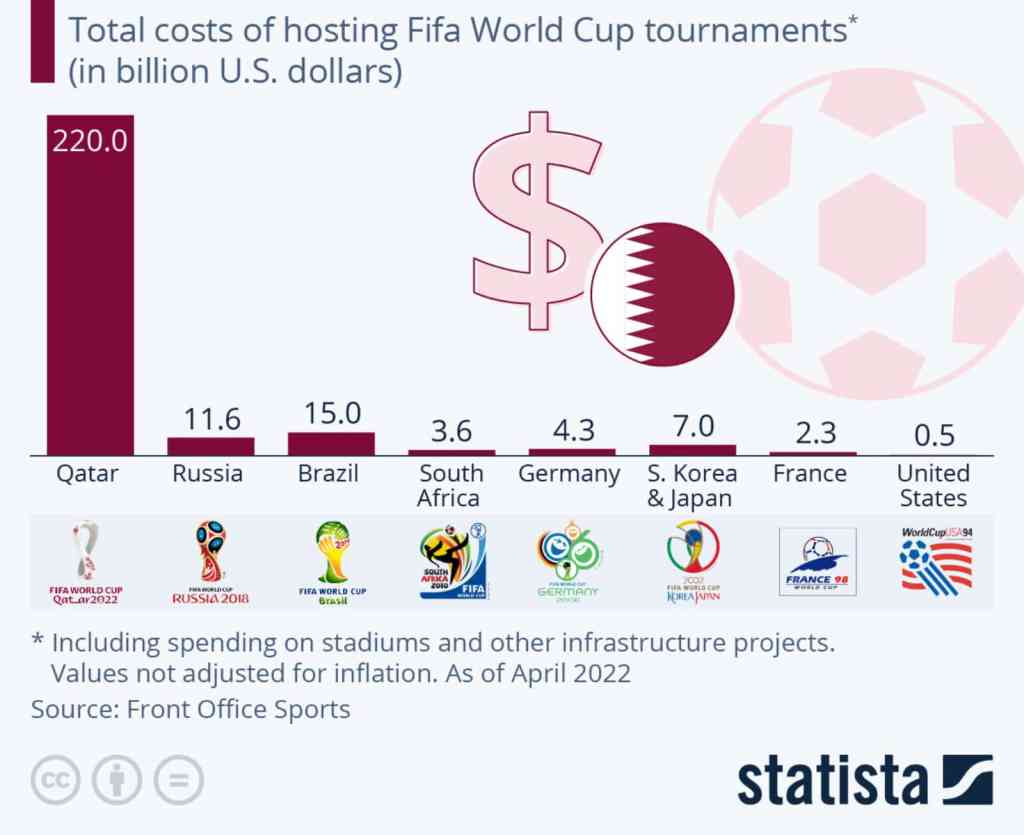
– BrinkNews.com
According to a sports marketing executive, the economic impact for Dallas will be “monumental” and the equivalent of “nine Super Bowls coming to town.” This might sound familiar to Dallas residents. In 1994, Dallas hosted World Cup games and projected high economic impact numbers. When the games ended, the city found that it had brought in just over 50% of what was projected. But the sports marketing executive isn’t worried. Why?
“I think the world has changed since 1994, there was no social media in 1994, so everybody posting from Dallas the impact of Dallas is gonna be much bigger” – Larry Lundy, CBS News, 02/04/24
Well, I am sold.
4) Philadelphia
According to local officials, the 2026 World Cup games will likely bring a “huge economic windfall” to the city and region. Some estimates have the economic impact at “$500M to Philadelphia“. This includes $262 million in potential direct spending. Philadelphia has been increasing its tourism budget for some time now. By some estimates, it has contributed close to $25 million to FIFA expenses.
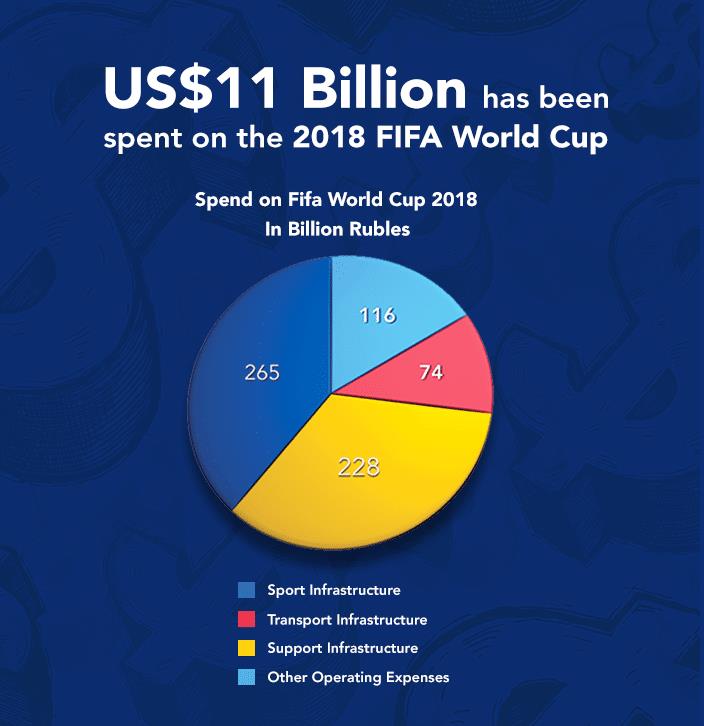
– Instarem.com
5) Seattle
Local officials in Seattle expect the 2026 World Cup to bring in $100 million in economic impact. Maybe more? According to officials in Seattle, the games will have a “huge impact” on the city because each game “will feel like a Super Bowl.” Earlier this year, the mayor of Seattle wrote a memo showing that the expected expenses for hosting the World Cup in Seattle would only be about $10 million. But there does seem to be some confusion about whether or not FIFA is paying for certain expenses. The mayor’s memo claims that “the city would be reimbursed for or recoup nearly all the money” and that “FIFA would reimburse Seattle for the stadium, police and field costs“.
But as the Seattle Times wrote in a story, the World Cup 2026 bidding guidelines state that FIFA tells host cities “to take responsibility for security costs“. Another city official claims that the mayor is assuming that they would be repaid “based on representations made by FIFA to the United 2026 bid committee“. Good luck getting that money back. Then there are costs that the city will claim are not just for the World Cup. However, the projects do likely need to be in place because of the approaching World Cup. For example, Seattle’s bid contained a new downtown waterfront park. Before the bid, the city had discussed building this but it never went anywhere. Now, it is unknown if it needs to be built before the World Cup comes to Seattle. Also, the mayor of Seattle’s memo doesn’t detail the potential costs for security liability and tax breaks. That could end up costing the taxpayers quite a bit.
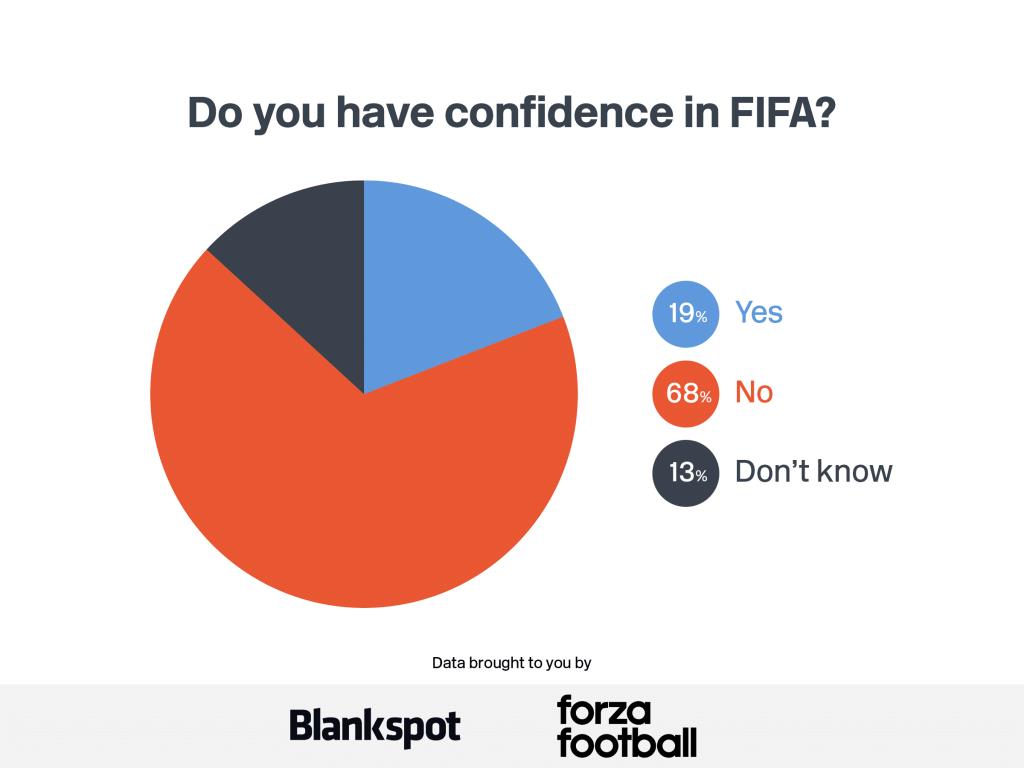
– ForzaFootball.com
6) Atlanta
Local officials believe that the eight scheduled World Cup games “will be unlike anything the City of Atlanta has ever hosted” and compared it to “hosting multiple Super Bowls at once“. Local businesses have called this event the “biggest sporting event in Atlanta history“. The Atlanta Business Chronicle claims that the World Cup will bring an “economic boon” to the city. According to a Boston Consulting Group impact analysis, the World Cup could contribute approximately $415 million in net economic benefit to Atlanta. But are those numbers realistic? One soccer blog wrote that these estimate numbers were “extraordinarily optimistic at best“.
Over the years, Victor Matheson has written several papers on the economic effect of hosting the World Cup. It does not end well. His most recent story on this subject, “The Economics of the World Cup”, discusses how poorly previous economic impact forecasts have been. Sometimes the forecasts are “so outlandish as to defy common sense“.
“Dr. Victor Matheson, a professor of Economics and Accounting at Holy Cross and the author of several studies on the World Cup’s economic impact, says that a good rule of thumb for most economic impact numbers cited for major sporting events is to take the original number and move a decimal place over one spot to the left. For a $400 million evaluation created by a group being paid to make the group he paid them look viable, you should probably consider it closer to a $40 million evaluation” — The Striker, 06/22/22
As Field Of Schemes reminds us, the Boston Consulting Group wrote this analysis “under contract to the 2026 World Cup bid committee“.
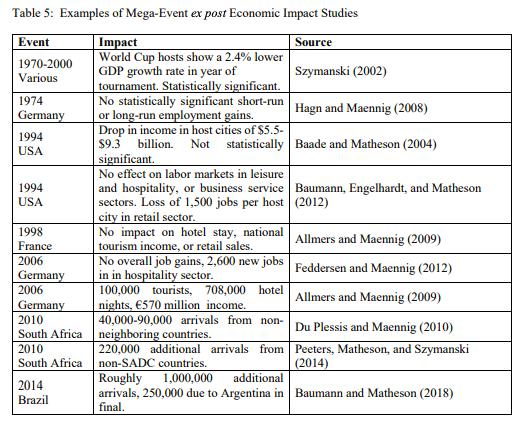
– FieldOfSchemes
7) Toronto
In Toronto, local taxpayers were told in 2018 that it would cost the city “between $30 million and $45 million”. Even better, the city released its projections showing that the World Cup would bring $307 million into the area and 3,300 new jobs. Fast-forward to 2022, and the cost has risen to $300 million. It keeps rising. A CBC.ca reporter wrote a story last week discussing how Toronto officials were being told to hand over an additional $80 million for World Cup preparations. That means Toronto taxpayers are closing in on almost $400 million of their money being given for the games.
But guess what? The Toronto City Budget Chief turned that frown upside down by reminding everyone about this magical and “almost unquantifiable benefit” that hosting the World Cup games brings to a city. He also discussed how $380 million was not a big deal since the “economic return will be much more valuable for the city in job and economic growth.” Other local officials noted how the cost increase was difficult to stomach. However, the games still were an “incredible investment” that would create “job growth and ultimately place the city on the map.”

– Hortenzia.net
8) Kansas City
Early this year, local organizers pushed Kansas lawmakers to spend $28 million in taxpayer money on World Cup preparations in return for $163 million in economic benefits. This would be on top of the $10 million previously given by the state. When state lawmakers pushed the organizers to explain how the area would see $163 million in economic benefits, they couldn’t and instead “did not go into detail on how that estimate was calculated or how much of that benefit Kansas would lose if no additional taxpayer money were allocated.” That sounds extremely scientific. But even though the organizers couldn’t explain their benefit numbers, they continued to make big promises, such as that everyone within a 200-mile radius of Kansas City would see an economic impact.
9) Chicago, Minneapolis, Vancouver and others
These cities were in the running to host the World Cup. Yet all of them either pulled out or simply refused to agree to certain terms with FIFA.
“Local authorities from those cities cited heavy-handed requests from Fifa and the United Bid that included potentially huge taxpayer bills, as well as hosting contracts that exposed their cities and residents to immense financial and legal risk” — Guardian, 03/19/18
Chicago Mayor Rahm Emanuel discussed some of FIFA’s insane demands:
FIFA would be allowed to do whatever they wanted, whenever they wanted and however they wanted…and cities were not allowed to protect citizens in any way possible? In Vancouver, when local leaders saw FIFA’s contract terms and objected, the city was dropped as a finalist. What exactly did Vancouver object to?
- FIFA consistently states that the cities must pay for virtually 100% of the expenses
- FIFA requires cities to pay for security and for that security to be of the “highest quality“…meaning expensive.
- FIFA demands extra power grids that would have forced Vancouver to “install a second, independent power supply“
- FIFA demands that “all taxes” of any kind be paid by the host city.
I thought a local Vancouver reporter summed up that city’s thoughts of FIFA quite well:
“Reading through…FIFA’s Host City Agreement for the World Cup is a jaw-dropping experience that left me with just one question: Why would any city even consider signing a contract this outrageous, grotesquely unfair and completely unreasonable? Prepare to be stunned. And then thank your lucky stars that the government took one look at it and walked away” – The Province, 03/22/18
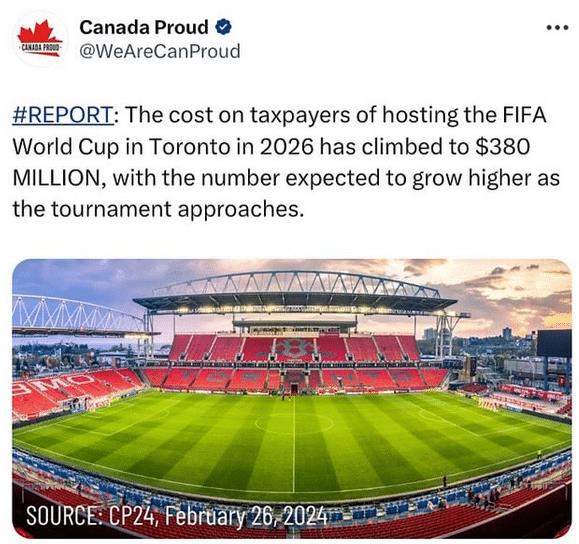
– Instagram.com
The post The World Cup is going to make everyone billions and billions of dollars appeared first on Subsidy Stadium.
https://subsidystadium.com/2024/03/05/the-world-cup-is-going-to-make-everyone-billions-and-billions-of-dollars/
 Backyard GrillingWeekend WarriorsAdvice from DadBeard GroomingTV Shows for Guys4x4 Off-Road CarsMens FashionSports NewsAncient Archeology World NewsPrivacy PolicyTerms And Conditions
Backyard GrillingWeekend WarriorsAdvice from DadBeard GroomingTV Shows for Guys4x4 Off-Road CarsMens FashionSports NewsAncient Archeology World NewsPrivacy PolicyTerms And Conditions
